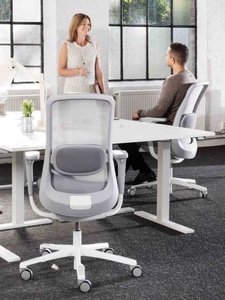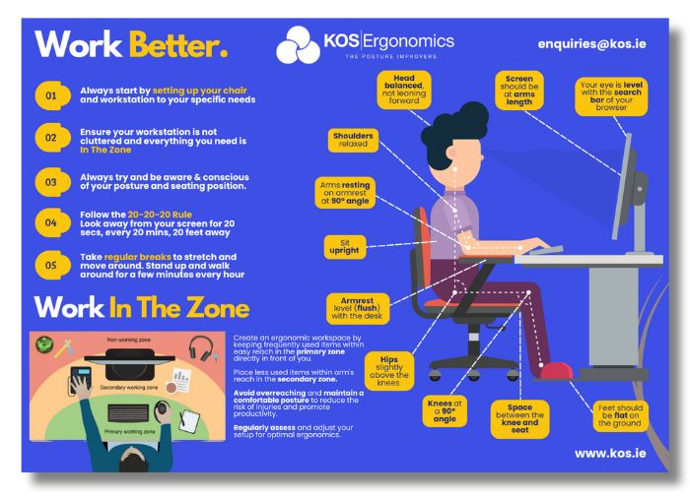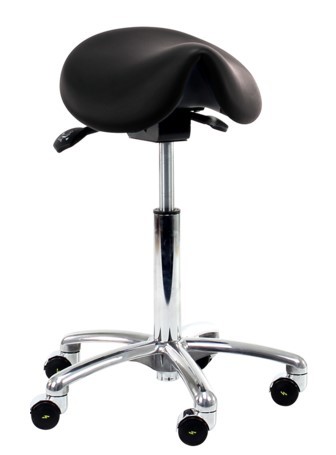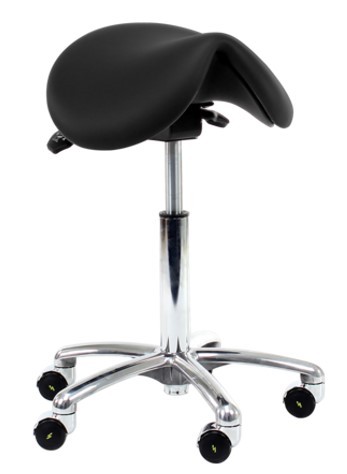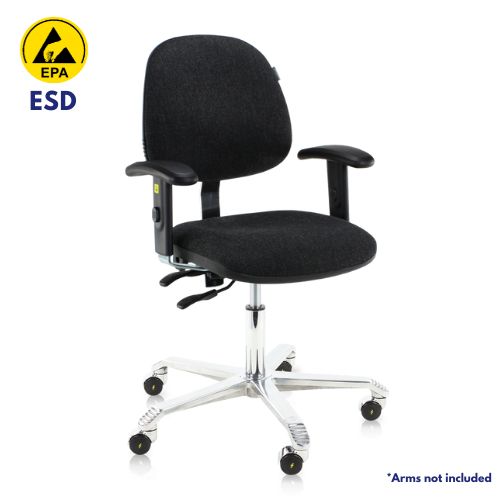
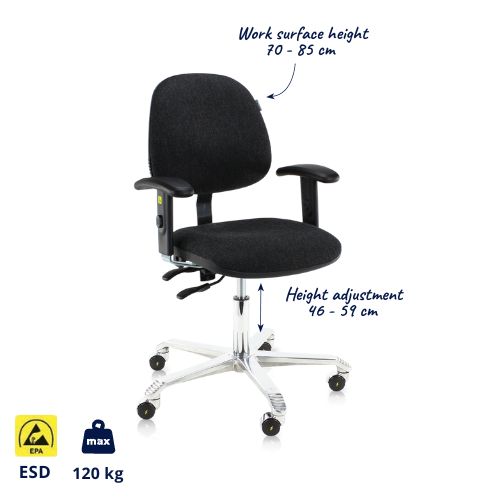

Spire K2300 ESD Chair | ESD Lab Chair | Anti-Static Chair
1
Spire K2300 ESD Lab Chair: Ergonomic Excellence for ESD-Safe Environments
The Spire K2300 ESD Lab Chair is a reliable and ergonomic solution designed to meet the specific needs of lab managers, medical professionals, and industrial workers. Its anti-static, conductive design ensures safe operation in ESD-sensitive environments.
Key Features:
- ESD Compliance: Meets IEC 61340-5-1 standards for electrostatic discharge safety.
- Ergonomic Design: Adjustable backrest, seat angle, and height for optimal comfort and support.
- Durable Construction: Built to withstand the demands of daily use in demanding settings.
- Multiple Colour Options: Available in Dralon or leatherette fabric in a choice of three colours.
Ideal Applications:
- Laboratories: Provides a comfortable and safe working environment for scientists and researchers.
- Healthcare Facilities: Supports medical professionals in various settings, including hospitals and clinics.
- Industrial Environments: Ideal for manufacturing and production facilities where ESD protection is essential.
Key Benefits:
- Improved Comfort: Reduces strain on the back, neck, and shoulders, leading to increased productivity.
- Enhanced Safety: Prevents damage to sensitive equipment and materials caused by electrostatic discharge.
- Long-Lasting Durability: Built to withstand the rigors of daily use, ensuring a long service life.
- Customizable Options: Choose from various colours and materials to match your workspace aesthetic.
Experience the difference with the Spire K2300 ESD Lab Chair. Contact us today to learn more and place your order.


Meets IEC 61340-5-1 standards for electrostatic discharge safety.
Low Grade; 7~8, Antistatic, Industry/Dental/Medical
Click Configure To Add Armrests & Choose Upholstery
This product is no longer available.
More Information
The Spire K2300 ESD Lab Chair is designed for professionals working in environments where electrostatic discharge (ESD) is a concern.
This includes individuals in the following fields:
- Laboratory technicians: Working with sensitive electronic equipment and chemicals.
- Scientists and researchers: Conducting experiments and handling delicate instruments.
- Healthcare professionals: Working in environments where static electricity can be a hazard, such as operating rooms or research labs.
- Industrial workers: Handling electronic components or working in industries where ESD can damage products.
- Dentists: The chair's adjustable height and armrests can help dentists maintain a comfortable and ergonomic posture during long hours of work. Additionally, the ESD protection can help prevent damage to sensitive dental equipment.
If you work in any of these fields and require a chair that can help prevent ESD damage, the K2300 ESD is a great option.
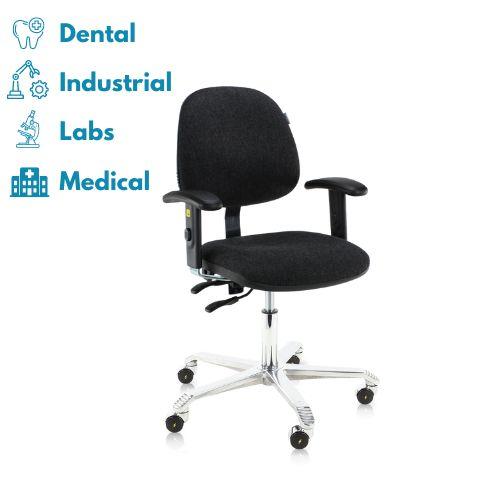
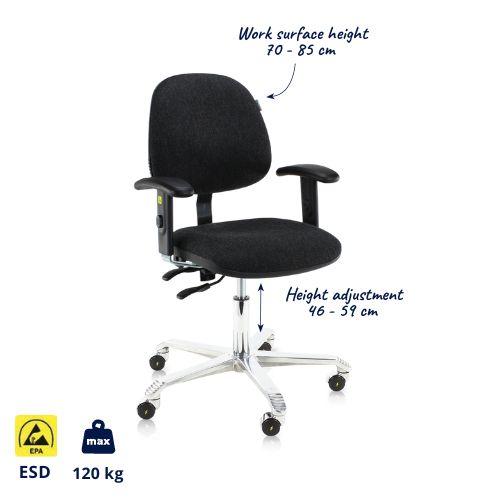
The Spire K2300 ESD Lab Chair offers a variety of features designed to provide a safe, comfortable, and productive workspace in environments where electrostatic discharge (ESD) is a concern.
Here's a breakdown of its key features:
ESD Protection:
- Conductive materials help to safely dissipate static electricity, preventing damage to sensitive equipment and materials.
- Meets IEC 61340-5-1 standards for electrostatic discharge safety.
Ergonomic Design:
- Adjustable backrest, seat angle, and height to provide optimal support and comfort.
- Inflatable lumbar support for added back support.
- Seat slider to adjust seat depth.
Durability:
- Built to withstand the rigors of daily use in demanding laboratory and industrial settings.
- High-quality materials and construction for long-lasting durability.
Customization:
- Adjustable armrests for added comfort and support.
Additional Features:
- Aluminium base for stability and durability.
- Soft swivel castors for easy mobility.
- Trumpet glides for use on all ESD floors.
These features make the Spire K2300 ESD Lab Chair a versatile and reliable choice for professionals working in ESD-sensitive environments.
My Heading 5
- Height Adjustment
- Working Height
- Seat Angle
-
Armrests
- Armrest Adjustment
-
Base
My Heading 5
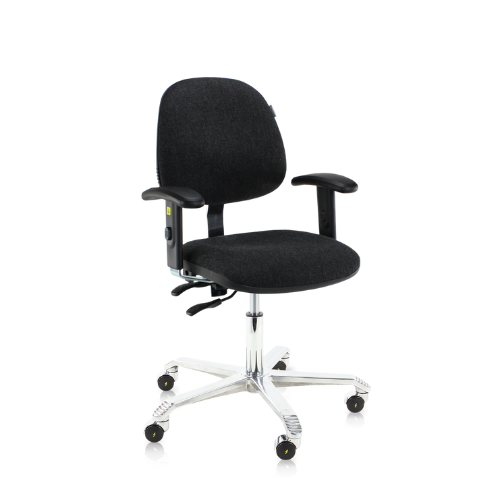
-
460-590 mm
-
700-850 mm
-
Adjustable
-
Armrests 5 ESD
-
Height and width
-
Aluminium base ø 670mm
My Heading 5
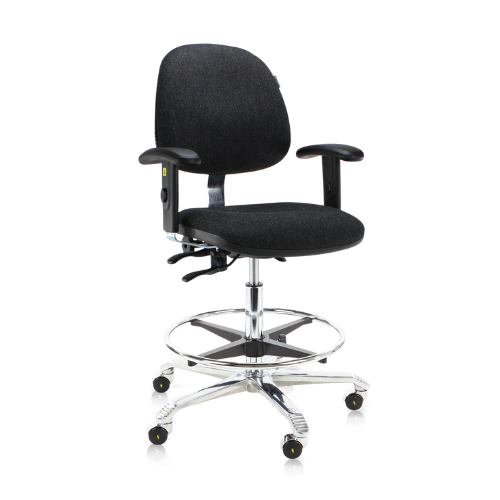
-
540-730 mm
-
800-1000 mm
-
Adjustable
-
Armrests 5 ESD
-
Height and width
-
Aluminium base ø 670mm
My Heading 5
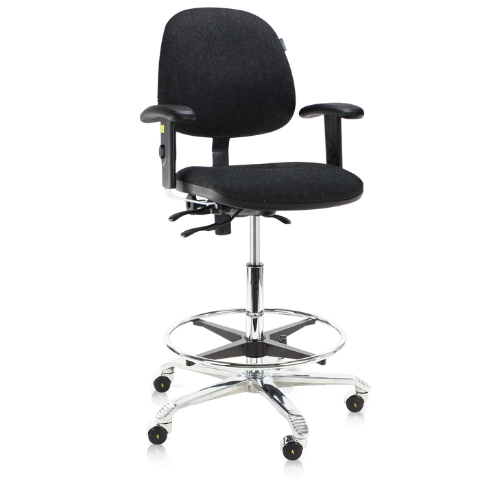
- 600-850 mm
-
900-1150 mm
-
Adjustable
-
Armrests 5 ESD
-
Height and width
- Aluminium base ø 670mm
Frequently Asked Questions
A: This is an online ergonomic training course designed to teach participants how to assess Visual Display Units (VDU) / Display Screen Equipment (DSE) safely and in compliance with Irish and European health & safety regulations. It covers workstation assessments, ergonomics, and MSD prevention.
A: This course is suitable for anyone responsible for workplace safety or office ergonomics, including:
-
Health & Safety managers or consultants
-
Health & Safety representatives
-
Occupational health professionals
-
Facilities management staff
-
Architects involved in office design
-
Office managers and business owners
A: No. This beginner-friendly online DSE/VDU course is suitable for anyone, regardless of prior ergonomics or health & safety experience.
A: The course is fully online via Microsoft Teams, featuring interactive lectures, group exercises, explainer videos, polls, and practical workstation assessments.
A: The course runs for 1 full day (9am–5pm) with breaks.
A: The course is delivered by highly experienced ergonomic and health & safety professionals from KOS Ergonomics, who work with leading Irish companies to reduce workplace risks and improve office ergonomics.
A: Yes. Participants who successfully complete the theory exam and practical assessment will receive a KOS Training Academy Level 1 VDU / DSE Assessor Certificate.
A: You’ll need a computer or tablet with a camera, microphone, and stable internet connection. A typical home or office workstation is sufficient for the practical exercises.
A: Key topics include:
-
Ergonomics and anthropometrics for office work
-
Hazards and risks associated with VDU/DSE use
-
Legal requirements under Irish and EU legislation
-
Workstation setup, environmental factors, and emerging trends (hot-desking, sit-stand desks, home working, laptop/tablet use)
-
Practical assessment and evaluation techniques
A: Yes. The course covers Regulation 72 of the 2007 Safety, Health & Welfare at Work Regulations, along with European Directive 90/270/EEC to ensure compliance for all EU countries.
A: Absolutely. By training staff as certified VDU / DSE assessors, your organisation can reduce musculoskeletal disorders (MSDs), improve employee wellbeing, and ensure compliance with legal obligations.
A: Yes. Participants have access to KOS Ergonomics’ expert advice and resources for any follow-up questions related to workstation assessments or ergonomics.

To install this Web App in your iPhone/iPad press ![]() and then Add to Home Screen.
and then Add to Home Screen.

